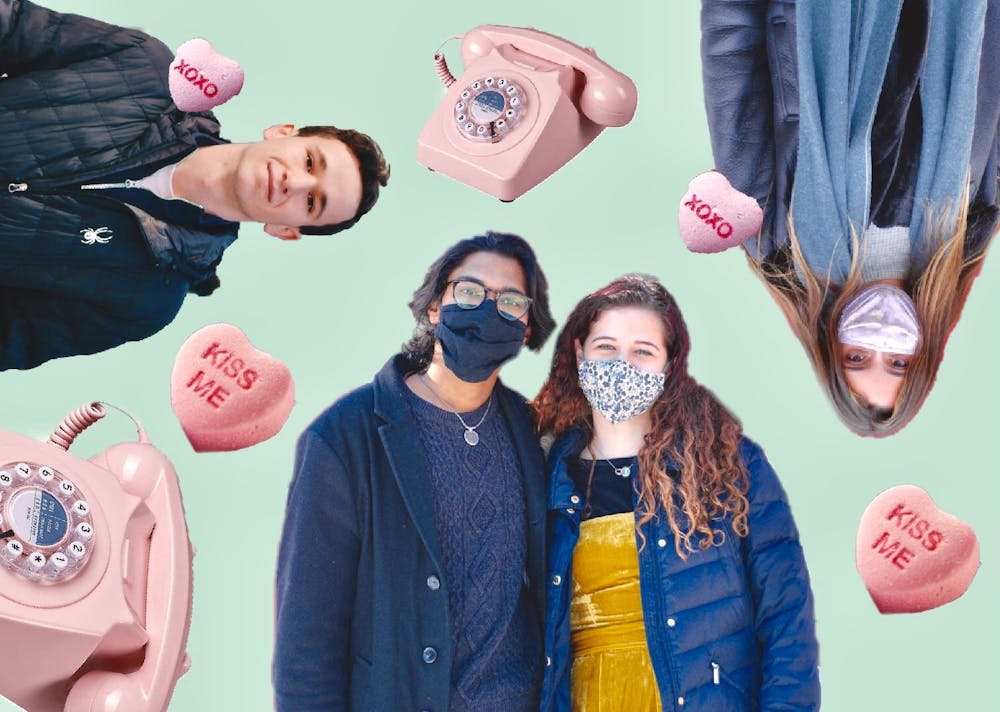On her first real date with her high school semi–sweetheart, Jo Howard (C '24) already knew their relationship’s expiration date. The pandemic provided the perfect opportunity to finally find closure from the drawn–out, will–they–won’t–they high school relationship that existed between Jo and her now–ex.
It was a crisp, calm night in early December; they had just seen a drive–in Christmas light show and now sat on the beach talking and hugging. But on Jan. 10, their perfect love oasis was scheduled to end, as each would soon leave their quarantine pod of hometown friends to move to college for the first time.
“We wasted basically the last four years wanting to date each other, and then always missing each other—never quite matching up,” Jo confesses. “I just really wanted the time to be together, finally, and have it be real.”
In the span of their one–month relationship, Jo spent many spontaneous Wawa trips and long movie nights getting to know a gentler, sweeter side of her ex–boyfriend, for whom she very much still has feelings. In fact, their mutual breakup occurred solely for rational reasons: They wouldn't be able to visit each other at college due to the confines of the pandemic, and Jo knew she couldn’t commit to a fully virtual relationship. As a result, both partners savored their single month together carefully, appreciating each other’s company solely for its value in the moment.
Like many couples, Jo and her ex–boyfriend faced the unique challenges of dating during the COVID–19 pandemic. A host of health and logistical problems have forced us all to confront whom we interact with in close quarters. For people in relationships, their significant other often becomes the primary source of this social interaction. During quarantine, some relationships grew stronger over creative combinations of long FaceTime calls, walks, meet–ups, and shared apartment space. Others struggled with the challenges of vast physical distance or premature move–ins together. More than anything, the pandemic highlighted the factors that make any relationship successful: purposeful communication, complementary personalities and behaviors, and a genuine appreciation for each other’s company.
Celine Okcu (W '22), an international student from Turkey, started dating her girlfriend in February of 2020. When the University closed its campus a month later, she had nowhere to go except her new girlfriend’s family’s house, where she stayed until June.
Within a few weeks of Celine moving out of her girlfriend’s house and into her new apartment in Philly, they broke up. Because of the rapid acceleration of their relationship, the couple never got the chance to develop familiarity and a routine with one another—the basis of a strong relationship.
“The transition being so fast caused us to isolate from some parts of each others’ lives,” Celine says. “She didn’t know any of my friends because she couldn’t meet them. She didn’t know where I like to go out or what I like to do when I go out.”
Instead of gradually entering into the world of her girlfriend’s friends and acquaintances, Celine was thrown into an intimate first–hand experience of her girlfriend’s family life.
“Getting to know your relationship with your family members within a month of knowing each other is a lot,” she says. And when forced to live in the same space 24/7, the pressure to avoid conflict led both women to make sacrifices, putting strain on the preexisting weaknesses in their relationship.
“I just feel like those problems could’ve been talked about and overcome, if we weren’t living together,” she says.
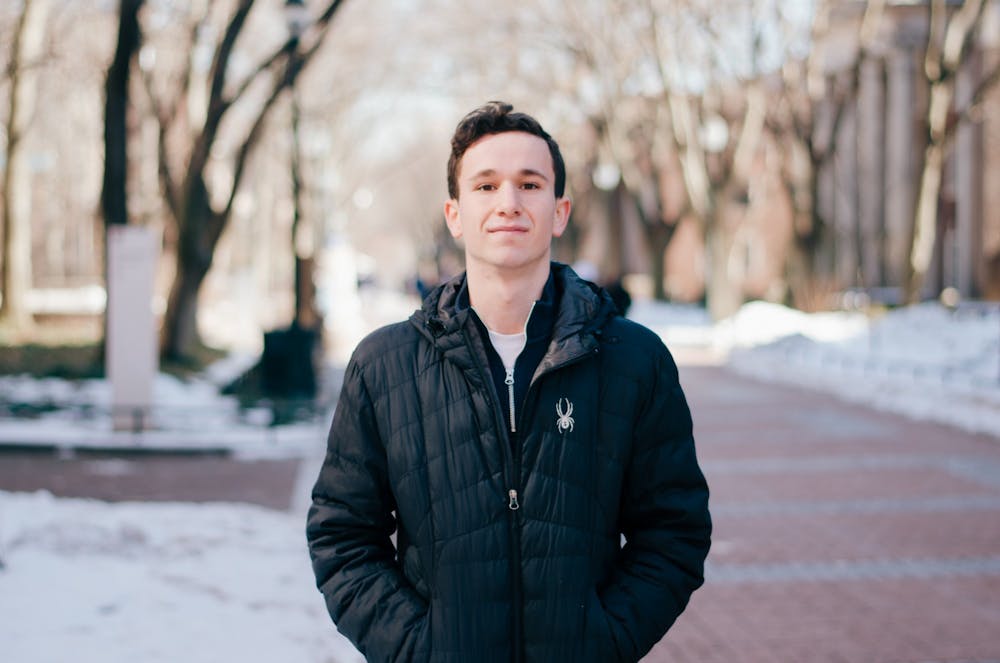
Yoni Perla
For Celine and her ex–girlfriend, the intimacy of navigating a budding romance while at home strained their relationship. For Yoni Perla (C '24) and Amalya Charytan, it only deepened their connection.
Like Celine, much of Yoni’s interactions with his girlfriend were in the company of her family. Having briefly crossed paths on gap year programs in Israel, the two reconnected when Amalya moved to Yoni’s hometown of Riverdale, N.Y. Over the quarantine spring and summer months, the lovebirds would spend countless picturesque socially distanced walks and hikes together. Now that they’re apart, they keep up virtual dates, and Amalya even sends Yoni handwritten letters.
Part of what attracted Amalya—a first year at New York University—to Yoni were his interactions with her family during the spring.
“He's just always able to connect with people. Right away, my family loved him. They love when he's around, so I love watching that,” she says.
There may be a psychological explanation for why seeing your significant other in a new context can have such a consequential effect on your relationship.
“When we get to know someone, it’s not just a relationship between two people. It’s our habits, connections, assumptions—a whole relational world,” says positive psychology professor James Pawelski, who co–authored the book Happy Together: Using the Science of Positive Psychology to Build Love That Lasts with his wife, Suzann Pileggi Pawelski.
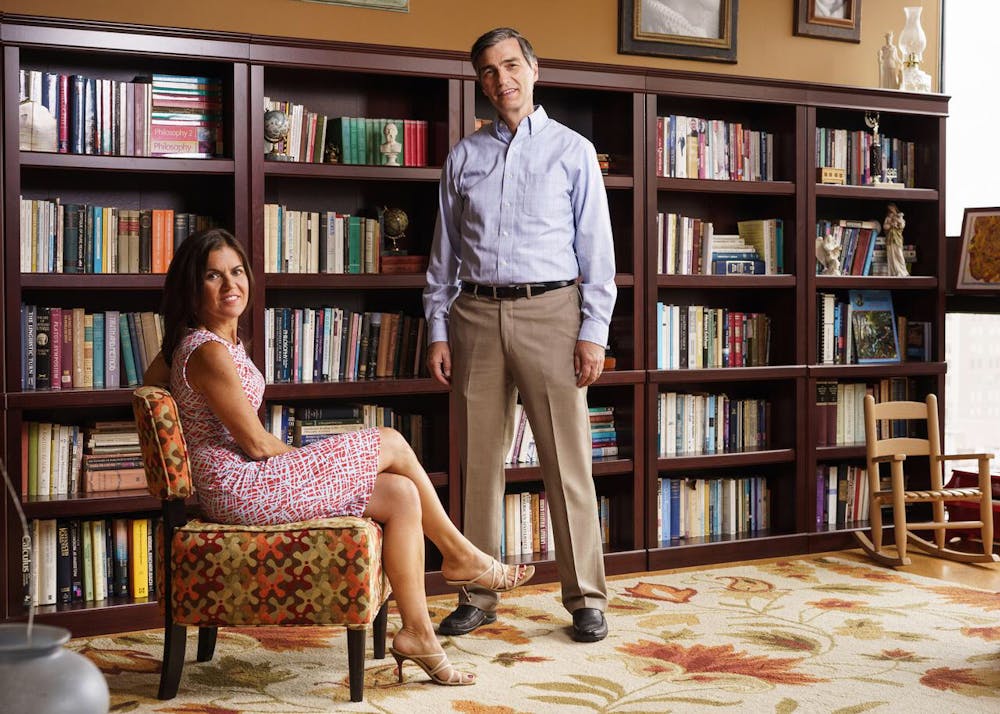
Photo courtesy of James Pawelski and Suzann Pileggi Pawelski
Like when your childhood friend visits you in college, your significant other meeting your family and visiting your home—a completely different relational world—can feel strange and uncomfortable. But it also creates potential.
Pawelski poses important questions that each partner should think about. “‘If I’m feeling odd, or strange, or lonely, even though I’m in this relationship because it’s socially distanced—does that mean we’re not right for each other?’” he says. “Or does it mean, ‘Wow, what a great opportunity. We get to know each other in a new context!’”
Tracy Zhang (C, W ‘24) and her boyfriend didn’t have the opportunity to be together in person during the pandemic, and eight months of increasingly sparse video calls proved too weak to maintain a spark across the 2,000–mile distance between Wisconsin and California.
The couple, who first started dating during their gap year in South Korea, spent the last few blissful pre–pandemic months exploring the vibrant sights, sounds, and flavors of Seoul. As both were forced to end their gap years early and return home, the monotony of quarantine couldn’t compare to the novelty and excitement of a blossoming romance in a foreign city.
“We couldn't find any good ways to spend quality time together. Even though we sometimes liked to play games or watch shows together, it just never really felt the same. The longer it went on, even calling each other wasn't really that engaging anymore. We started feeling like it just wasn’t a good use of time,” Tracy says.
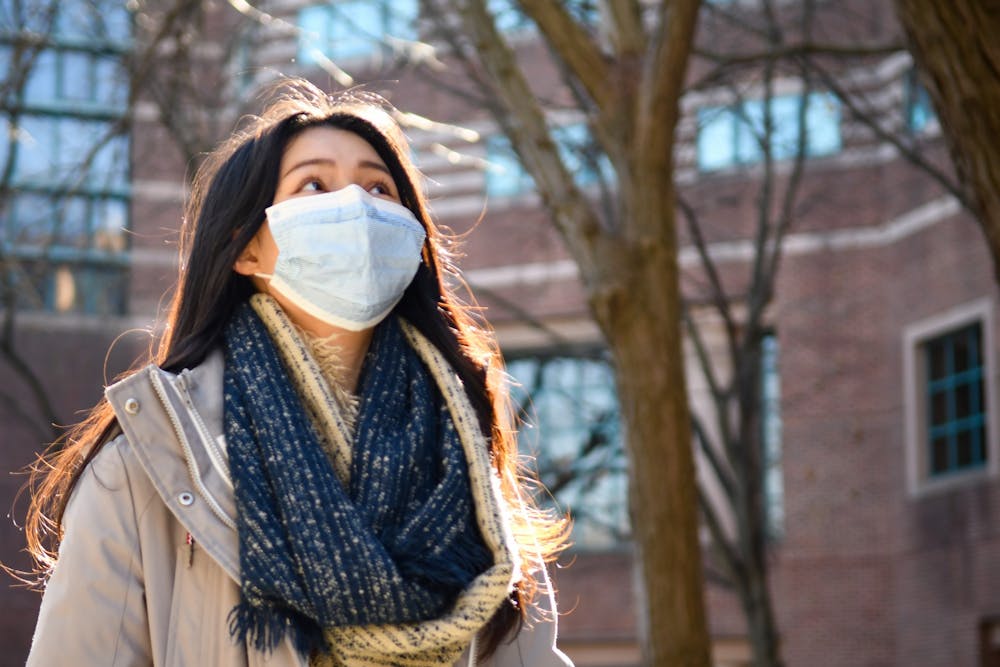
Tracy Zhang
Jaden Stevens (C '23) and Nick Christoffersen (W '23) also spent eight months of 2020 physically apart, but they found that the long distance ultimately made their relationship stronger.
After meeting through a mutual friend during their first–year spring, the two spent six weeks glued at the hip before campus shut down and they were forced to leave—Jaden to New York, and Nick to Toronto.
The couple watched with frustration as months passed and the United States–Canada border remained closed. With no possibility of in–person interaction in the near future, the couple made the most of their time by connecting virtually.
In Jaden’s three–year long–distance high school relationship, time spent apart meant time spent waiting. “When we couldn't see each other, we were killing time, so we wouldn't have many really good conversations,” she says. “It would be a lot of ‘What did you do today?’ and ‘I can't wait to see you in three weeks.’”
Unlike her previous romance, Jaden felt that every minute spent on a video call with Nick meant time to appreciate each other’s company, rather than just time in limbo until they next saw each other. They had successfully moved beyond the standard catch–up phone calls that often mark other long–distance relationships—“How are you? What did you do today? Still experiencing life in a global pandemic?”—and into engaging conversations meant to get to know each other on a deeper level.
“She liked me for who I was,'' Nick says. “She liked talking to me. Even if I was on a screen 300 miles away, she still loved spending time with me. And that means the world. Someone like that, you don't find that often.”
He adds, “If you can make it through the pandemic, you can make it through almost anything in life together.”
A survey of 5,000 single people across America from dating platform Match found that 58% of daters have shifted towards more “intentional dating,” or dating with a stronger sense of purpose and conscious choice, rather than just for fun. Even higher percentages are choosing to be more honest with potential partners and have more meaningful conversations before meeting up in person. On video–call dates, like the ones shared between Nick and Jaden, 56% of people felt romantic chemistry, and 50% said they'd fallen in love while on a call.
One technique that couples can use to maintain the romance of a relationship virtually is what Suzann Pileggi Pawelski, lead author of Happy Together, calls “prioritizing positivity.”
“Prioritizing positivity is using activities, hobbies, and interests and scheduling them into your day,” she says. “Most people just focus on the feeling—‘I want to be happy. I don't feel good’—and they’re so caught up in seeking that emotion.”
In the context of the pandemic, prioritizing positivity means focusing less on negative emotions produced by external limitations in a relationship, and focusing more on finding activities that suit both partners’ personalities and enliven their emotional states when they’re together.
Rather than spending their calls commiserating about the stress of not knowing when they could next see each other, Nick and Jaden played “Hot Seat,” a game where the couple prevented conversations from dying by taking turns asking each other challenging and personal questions late into the night. They set times to call each other and slowly made their way through the show New Girl, one episode a night.

Jaden Stevens
A relationship can do more than just survive the pandemic—it can provide you with a support system to help weather increased isolation. Worry and stress over COVID–19 has taken a toll on the mental health of a majority of Americans. Forced physical quarantine leaves more people vulnerable to loneliness, which has long been linked to poor health outcomes. Having a significant other you can trust and share your anxieties with provides stability during these uncertain months.
“All of March and April were such a blur, and I would just look forward to talking to [Nick] so much,” Jaden says. “He's always so smart—I would feel lazy and lethargic, and he was always so witty, so energetic.”
“Being able to have a deep connection over the phone, it actually didn't always feel like I was alone in the pandemic, as much as I wasn't physically with somebody.”
But relying too much on a relationship to provide stability and comfort can be a negative force for others. In a Monmouth University Poll from May 2020, 26% of people said that their relationship added to the stress of dealing with the pandemic, while only 14% of people said that their relationship decreased their stress levels.
Speaking from personal experiences and observations of her friends, Celine cautions people against latching onto a relationship in quarantine.
“There’s a fear of being alone. Before the pandemic, I was always with my friends going out … After the breakup, I finally learned how to be by myself during the pandemic," she says.
Sabrina Ochoa (C '21) is frank about the complicated mess of positive and negative effects the pandemic had on her relationship with Jahnik Kurukulasuriya (C '21).
“It had two sides. We were both really starved for social connection, like a lot of people, so talking to someone kind of satisfies that," she says. "But the virtual aspect of it really caps its efficacy in fulfilling your social needs.”
Even though Jahnik remained steadfast in supporting Sabrina virtually, their conversations over FaceTime could never be a substitute for the simple comfort of being physically together—her sidling up to him as she tells a funny story or laying her head on his shoulder and crying after a rough midterm.
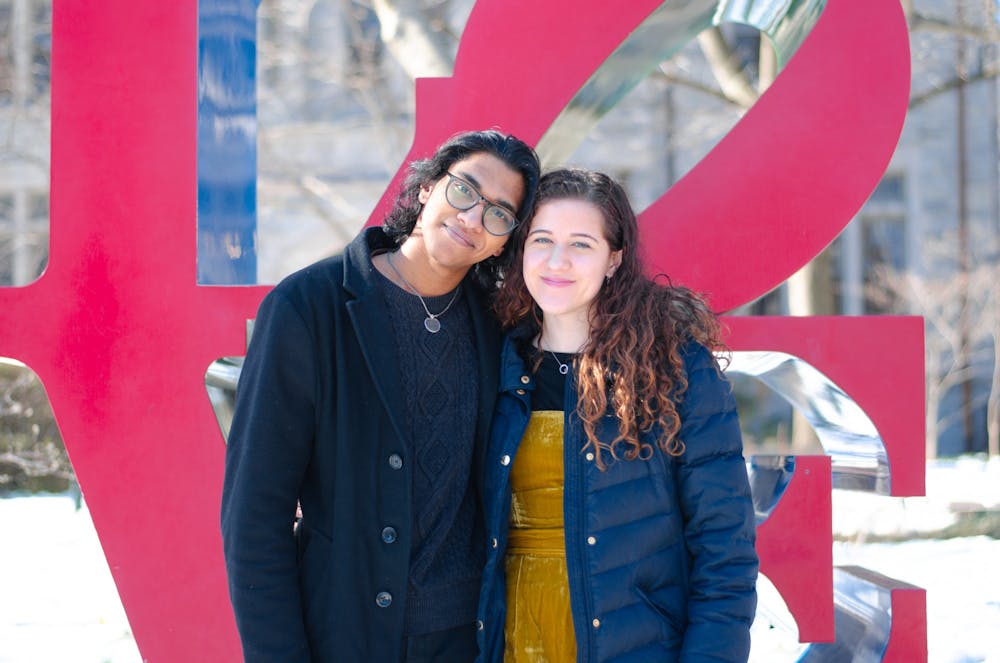
Sabrina Ochoa and Jahnik Kurukulasuriya
Sabrina and Jahnik met on their first day of their first year at Penn. Jahnik seems to remember it best.
“[The University] took us all out to Penn Park and had us stand in the shape of ‘2021.’ On the way to that, I saw her walking, recognized her as someone from my hall, and talked to her,” he says.
Two weeks into their first year, Jahnik asked Sabrina on a date. A little more than three years later, the lovebirds were forced to face the COVID–19 pandemic, moving in together in the spring, going long–distance in the summer, and returning to Philadelphia in the fall.
Sabrina had a harder time dealing with the pandemic, something Jahnik recognized and tried to alleviate.
“I deep–cleaned out our bath—which was a little gross—and I drew her a bath, and from then on she took baths to relax and unwind when she was stressed," he says. "I started lighting incense. I started waking up early and making her food in the morning. Anything to make her day a little better.”
The two seniors have had success with finding activities that “prioritize positivity.” Jahnik bought Sabrina a video game that he watched her play, something both partners found thoroughly entertaining. Sabrina persuaded Jahnik that driving around a graveyard was a fun date night activity, which he was surprised to find was true. They took their first road trip alone together to Niagara Falls, where they pranked their friends with pictures of fake honeymoon certificates.
“That’ll be interesting to confuse any of our future children,” Jahnik laughs.
Even in video calls, they were fairly innovative—brushing their teeth together in the morning or riding along in each other's cupholders as they each went to get lunch.
Dating during quarantine is a lot like looking through an old viewfinder: It brings everything about relationships—the good and the bad—into focus. Sabrina and Jahnik were forced to adjust the patterns of their long–term relationship, finding new ways to care for one another. Jaden and Nick contended with 300 miles of distance and deepened their emotional bond via video–chat. Celine and Tracy, whose relationships did not make it through the pandemic, now have a greater understanding of what works and what doesn’t in a budding romance.
Finding love in quarantine is messy. It’s full of false starts and misunderstandings, challenging us to look inward to love outside ourselves.
